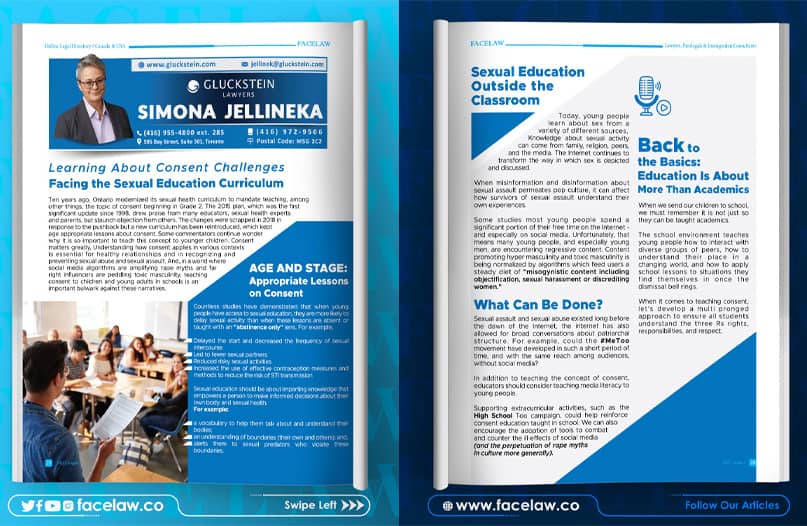Learning About Consent Challenges Facing the Sexual Education Curriculum
Learning About Consent Challenges Facing the Sexual Education Curriculum
By: Emma Partridge/Gluckstein Lawyers
Ten years ago, Ontario modernized its sexual health curriculum to mandate teaching, among other things, the topic of consent beginning in Grade 2.
The 2015 plan, which was the first significant update since 1998, drew praise from many educators, sexual health experts and parents, but staunch objection from others. The changes were scrapped in 2018 in response to the pushback but a new curriculum has been reintroduced, which kept age-appropriate lessons about consent.
Some commentators continue wonder why it is so important to teach this concept to younger children.
Consent matters greatly. Understanding how consent applies in various contexts is essential for healthy relationships and in recognizing and preventing sexual abuse and sexual assault. And, in a world where social media algorithms are amplifying rape myths and far right influencers are peddling toxic masculinity, teaching consent to children and young adults in schools is an important bulwark again these narratives.
Age and Stage: Appropriate Lessons on Consent.
Countless studies have demonstrated that when young people have access to sexual education, they are more likely to delay sexual activity than when these lessons are absent or taught with an "abstinence only" lens. For example,
-
Delayed the start and decreased the frequency of sexual intercourse
-
Led to fewer sexual partners
-
Reduced risky sexual activities
-
Increased the use of effective contraception measures and methods to reduce the risk of STI transmission
Sexual education should be about imparting knowledge that empowers a person to make informed decisions about their own body and sexual health.
For example:
-
a vocabulary to help them talk about and understand their bodies;
-
an understanding of boundaries (their own and others); and,
-
alerts them to sexual predators who violate these boundaries.
Sexual Education Outside the Classroom.
Today, young people learn about sex from a variety of different sources,
Knowledge about sexual activity can come from family, religion, peers, and the media. The Internet continues to transform the way in which sex is depicted and discussed.
When misinformation and disinformation about sexual assault permeates pop culture, it can affect how survivors of sexual assault understand their own experiences.
Some studies most young people spend a significant portion of their free time on the Internet - and especially on social media. Unfortunately, that means many young people, and especially young men, are encountering regressive content. Content promoting hyper-masculinity and toxic masculinity is being normalized by algorithms which feed users a steady diet of "misogynistic content including objectification, sexual harassment or discrediting women."
What Can Be Done?
Sexual assault and sexual abuse existed long before the dawn of the Internet, the internet has also allowed for broad conversations about patriarchal structure. For example, could the #MeToo movement have developed in such a short period of time, and with the same reach among audiences, without social media?
In addition to teaching the concept of consent, educators should consider teaching media literacy to young people.
Supporting extracurricular activities, such as the High School Too campaign, could help reinforce consent education taught in school.
We can also encourage the adoption of tools to combat and counter the ill effects of social media (and the perpetuation of rape myths in culture more generally).
Back to the Basics: Education Is About More Than Academics.
When we send our children to school, we must remember it is not just so they can be taught academics. The school environment teaches young people how to interact with diverse groups of peers, how to understand their place in a changing world, and how to apply school lessons to situations they find themselves in once the dismissal bell rings.
When it comes to teaching consent, let's develop a multi-pronged approach to ensure all students understand the three Rs - rights, responsibilities, and respect.





